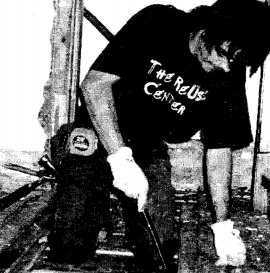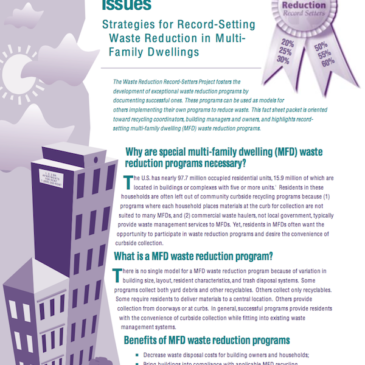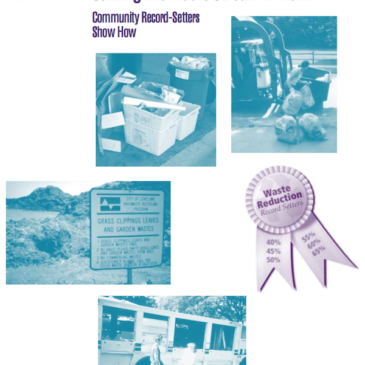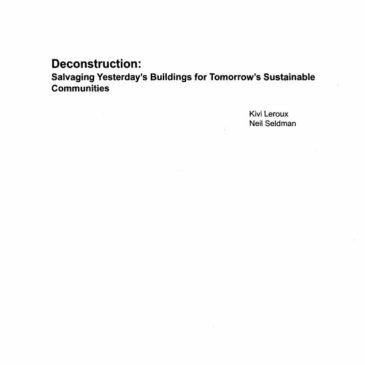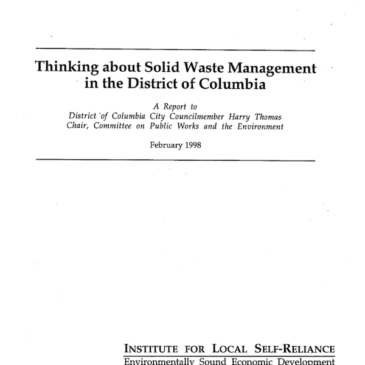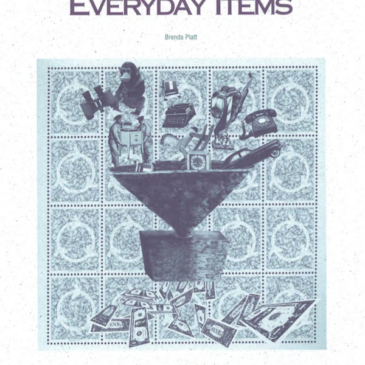Waste to Wealth Resources – Search Results
Return to Waste to Wealth home page
Page 5 of 7
Product Stewardship in British Columbia
This Facts to Act On examines product stewardship programs and policies in place in British Columbia, Canada: its deposit-refund system for beverage containers and its household hazardous waste stewardship program (covering used motor oil, paints, solvents, flammable liquids, domestic pesticides, gasoline, and pharmaceuticals).… Read More
Wasting and Recycling in the United States 2000
This report—prepared for the GrassRoots Recycling Network—summarizes the state of wasting and recycling in the U.S., details recycling’s many environmental and economic benefits, introduces the concept of zero waste planning, and concludes with an agenda for action. Recycling continues to increase, but is being outpaced by the rise in wasting. Landfill tonnage and interstate shipments of … Read More
Del Norte Zero Waste Plan
This zero waste plan is the first of its kind in the U.S. It describes policies and strategies for reaching zero waste in Del Norte (CA). Other communities aiming for zero waste will find this plan essential reading. by Del Norte Solid Waste Mgt. Authority staff, Self-Reliance Inc. staff, and other consultants 2000, 170 pages $15 … Read More
Deconstruction: Salvaging Yesterday’s Buildings for Tomorrow’s Sustainable Communities
Deconstruction is the process of carefully dismantling a building in order to salvage components for reuse and recycling. This report provides information to understand and advocate for deconstruction locally, regionally, and nationally, emphasizing partnerships with local nonprofit organizations, government agencies, and for-profit practitioners. A collaborative project of the Materials for the Future Foundation (San Francisco) and … Read More
Complex Recycling Issues: Strategies for Record-Setting Waste Reduction in Multi-Family Dwellings
Multi-family buildings are often overlooked when communities offer their residents recycling services. This fact sheet packet features four model apartment buildings and complexes, from garden apartments to high-rises, that are recycling between 20 and 65% of their discarded materials. Also profiled are five communities that provide recycling service to their multi-family dwelling sector. by Kelly Lease, … Read More
Cutting the Waste Stream in Half: Community Record-Setters Show How
This report and fact sheet packet of the same title feature 18 cities and counties recovering 40 to 65% of their residential waste. They profile each community’s program, drivers for waste reduction levels, materials accepted, set-out and collection methods, and equipment and operating costs. The fact sheet packet summarizes and complements the full report. Essential reading … Read More
Deconstruction: Salvaging Yesterday’s Buildings for Tomorrow’s Sustainable Communities
Deconstruction is the process of carefully dismantling a building in order to salvage components for reuse and recycling. This report provides information to understand and advocate for deconstruction locally, regionally, and nationally, emphasizing partnerships with local nonprofit organizations, government agencies, and for-profit practitioners. A collaborative project of the Materials for the Future Foundation (San Francisco) and … Read More
ILSR’s U.S. EPA-Sponsored Waste Reduction Project
ILSR’s Waste Reduction Record-Setters project (1996-2000), funded under an U.S. EPA grant, identified and documented record-setting waste reduction programs in the public and private sectors. The project identified 100 communities and nearly 200 businesses, institutions, and other organizations reporting waste reduction — the combination of waste prevention and recycling — rates at 50 percent or higher. … Read More
DON’T THROW AWAY THAT FOOD: Strategies for Record-Setting Waste Reduction
The Institute for Local Self-Reliance’s Waste Reduction Record-Setters Project fosters development of exceptional waste reduction programs by documenting successful ones. These programs can be used as models for others implementing their own programs to reduce garbage. The Don’t Throw Away That Food information packet below is oriented toward commercial and institutional food discard generators, and highlights … Read More
Government and Community-Based Sources and Strategies for Financing Recycling Enterprises
Prepared for the National Recycling Coalition by the Institute for Local Self-Reliance, this report discusses recent developments in community and small business financing, identifies barriers and current needs, and outlines steps for linking recycling-based community development and small business financing. Appendices list and survey prominent community development corporations and finance institutions. Download PDF (147 KB)
Thinking About Solid Waste Management in the District of Columbia
This report examines major solid waste issues facing the nation’s capital and offers recommendations for making ecologically sound and cost-effective improvements that build community and entrepreneuralism. The report includes recommendations on recycling, trash collection routes and vehicles, waste transfer stations, and retraining city workers. by Neil Seldman Download PDF File (2.52 MB)
Creating Wealth from Everyday Items
This report profiles six model reuse operations and seven programs that collect reusable goods from households. Each profile documents materials handled, marketing information, process and equipment utilized, costs, and replicability. The report also details job creation and other community benefits of reuse. View Introduction by Brenda Platt ISBN 0-917582-95-0, LC 97-1338 Download PDF File (8.92 MB)
Plug into Electronics Reuse
Because computers become obsolete so swiftly, they are often discarded with many or all working components. This report provides contact information on 150 computer recovery facilities as well as in-depth profiles of the operating experiences of 13 that focus on computer reuse. Operations profiled are all replicable and many are interested in starting similar enterprises in … Read More
Weaving Textile Reuse into Waste Reduction
By documenting 10 programs that collect discarded textiles from households, this reports shows how to integrate textiles into existing recycling programs. Key tips for replication (such as partnering with local charities) are highlighted. Appendices provide sample outreach materials and list companies accepting municipal textiles. by Brenda Platt ISBN 0-917582-93-4, LC 97-3520 Download PDF (17.7 MB)
Sustaining Businesses & Jobs through Pallet Repair & Reuse
While pallet repair businesses are becoming more common, many pallets are still discarded without repair or salvage. This report lists 31 pallet reuse businesses interested in expanding, and documents jobs through pallet recovery. Profiles of five enterprises detail sources of pallets, repair equipment and process, and more. An appendix lists 193 pallet recovery facilities. View Introduction by … Read More




